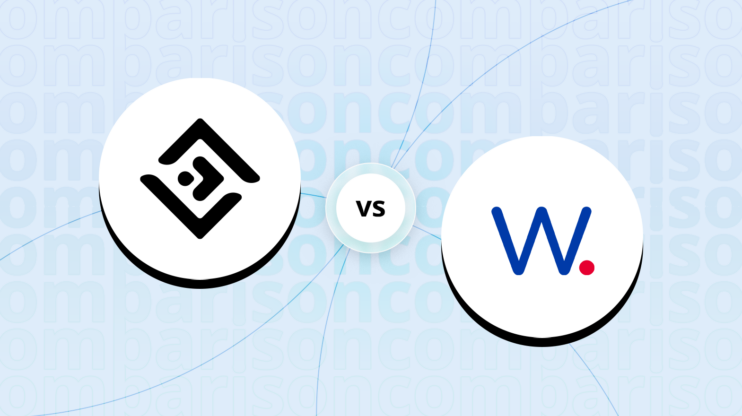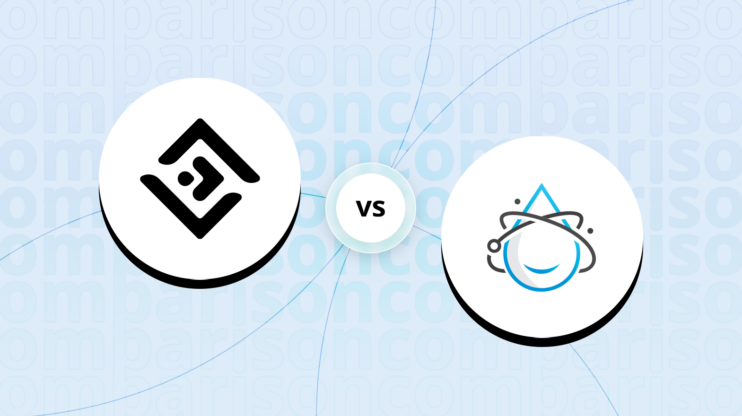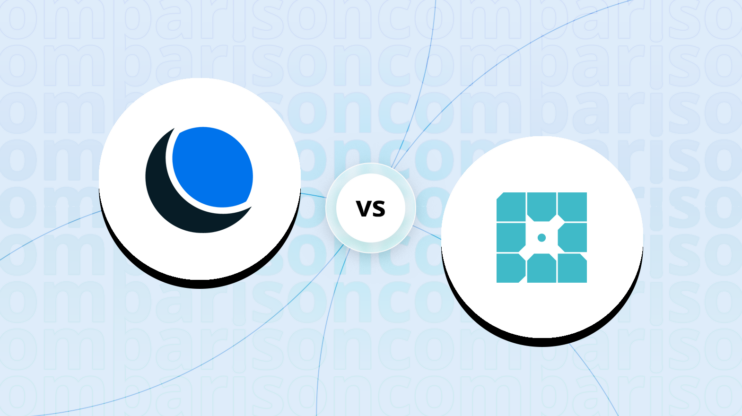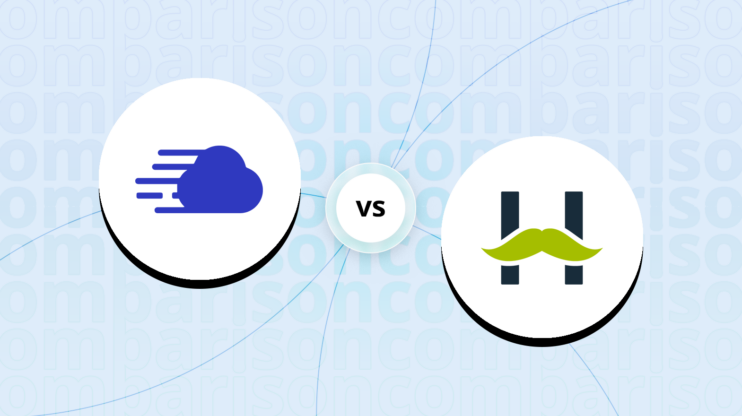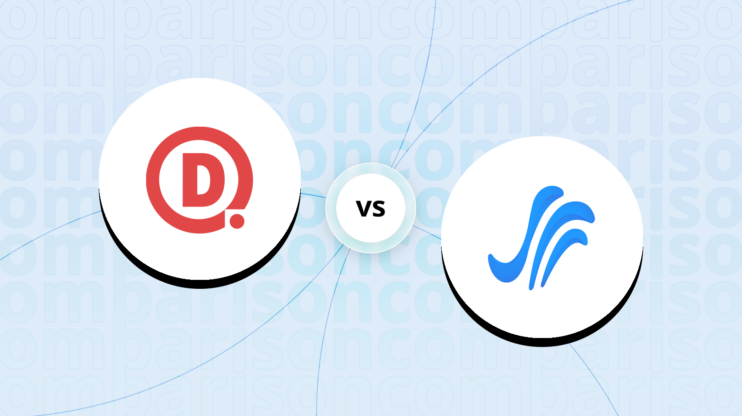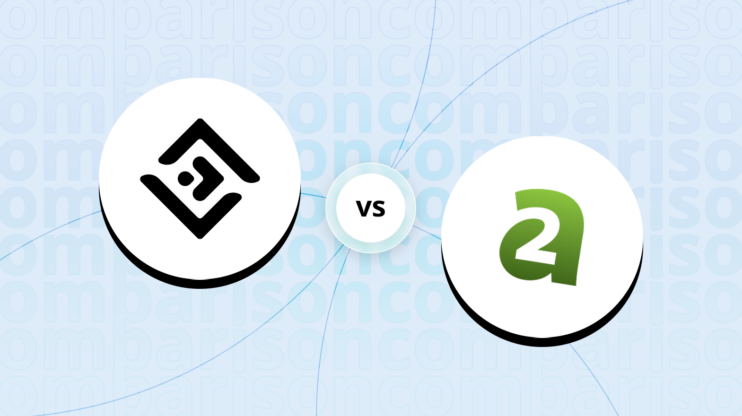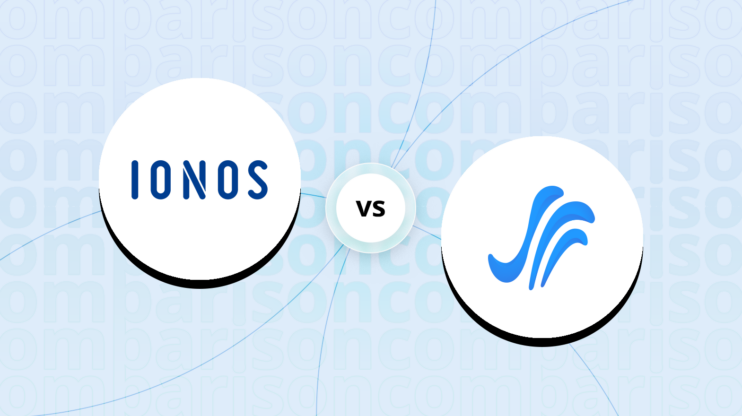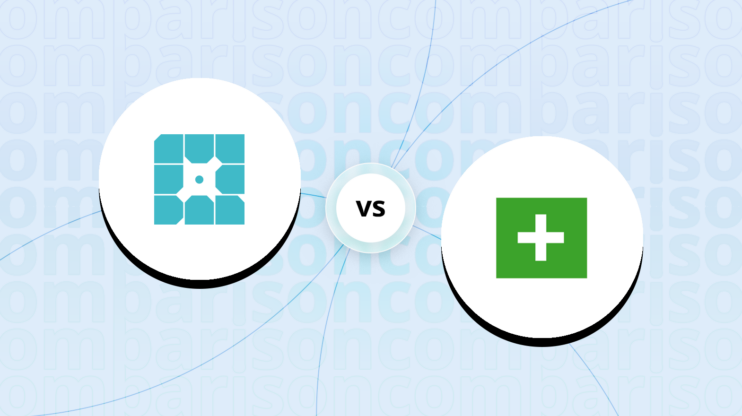Final verdict
Looking over Liquid Web vs. Web.com, each hosting provider offers unique strengths tailored to different segments of the market.
-
Liquid Web (Overall grade: 8.4)
excels in high-performance, enterprise-level solutions with robust security and compliance features. It offers a variety of hosting types including Managed WooCommerce, WordPress, VPS, and Cloud Dedicated Server hosting. Its high-speed infrastructure is supported by AMD EPYC and Intel Xeon processors, and NVMe or SSD storage, contributing to exceptional website performance. Liquid Web’s 100% network and power uptime SLAs with a 10x credit policy for any downtime, proactive Sonar™ Monitoring, and 30-minute hardware SLA ensure reliability. The comprehensive admin panel, 24/7/365 human support, managed hosting options, and adherence to stringent compliance requirements make it highly suitable for businesses needing secure, scalable, and high-performance hosting solutions.
Web.com (Overall grade: 7.3)
provides more affordable solutions that are ideal for small to mid-sized businesses and beginners. It features shared and WordPress hosting plans, including a user-friendly drag-and-drop website builder, free domain for the first year, and email hosting. Offering unmetered bandwidth, 24/7 support, and a 99.9% uptime guarantee, Web.com stands out for its simplicity and ease of use. Despite its strong support and practical features, Web.com falls short in areas requiring high performance and advanced management options. It lacks the high-end infrastructure, proactive management, and broader compliance features seen in Liquid Web, making it a more budget-friendly but less feature-rich choice.
 Overall grade:8.4 |
 Overall grade:7.3 |
|
|---|---|---|
| Uptime and Availability | 9.2 | 8.0 |
| Hosting Performance | 7.7 | 6.6 |
| Hosting Security | 9.3 | 8.2 |
| Price | 8.0 | 8.0 |
| Hosting Features | 6.4 | 4.8 |
| Ease Of Setup | 8.7 | 7.6 |
| User Management | 8.3 | 7.3 |
| Customer Support | 9.4 | 8.2 |
| User feedback | 4.3/5 | 4.0 out of 5/5 |
Hosting types offered
Both platforms provide a variety of hosting types, each designed to meet the different needs of users.
 |
 |
|
|---|---|---|
| Shared hosting | ||
| Cloud hosting | ||
| WordPress hosting | ||
| Ecommerce hosting | ||
| VPS hosting | ||
| Dedicated hosting |
Although both offer a variety of hosting plans tailored to different needs, in
certain cases, one platform may prove to be more suitable.
Detailed comparison
Uptime and availability
Evaluates the average uptime statistics, uptime guarantee and overall availability of the hosting
provider
Score Components:
- Uptime percentage (30%): evaluates the uptime statistics in given period of time
- Uptime guarantee (20%): Assesses if the platform offers an uptime guarantee and
whether the actual uptime matches the promised guarantee. - General performance (25%): Evaluates how fast is the average response time and overall
it’s stability. - Responsiveness (10%): Adaptability to different devices and screen sizes.
- Availability (25%): Reflects the total downtime and number of outages.
 9.2
9.2
 8.0
8.0
Section 1:
🏆 Winner Liquid Web: An exceptional choice for reliable high-availability hosting with excellent customer support.
Section 2:
Liquid Web stands out due to its 100% network and power uptime SLAs, coupled with a 10x credit for any downtime. Their proactive Sonar™ Monitoring ensures round-the-clock oversight, and the 30-minute hardware SLA guarantees timely component replacement. The managed high-availability features, backed by the use of CloudFlare CDN, provide added assurance of uninterrupted service.
Section 3:
Web.com offers a commendable 99.9% uptime guarantee with a strong record of actual uptime. Their 24/7 support and unmetered bandwidth make it a practical choice for various users. The inclusion of SSL security, automatic backups, and versatile programming support add to its appeal, but its uptime performance falls slightly short compared to Liquid Web.
Hosting performance
Score Components:
- Hosting speed (30%): This includes SSD quality, Load times, PageSpeed score ranges,
additional information on website speed, built-in plugins for performance enhancement, available caching
methods, and CPU/RAM options - CDN (20%): Considers whether CDN is available or not, whether it’s free or paid, and
the quality of the CDN service - Available data centers (30%): Evaluates the number of data centers and their locations
globally. - Scalibility (20%): Looks at whether elastic scaling is available, the process required
to scale (manual upgrade vs. automatic scaling), the presence of dedicated servers, and the costs
associated with scaling.
 7.7
7.7
 6.6
6.6
🏆 Winner
Liquid Web: For users who prioritize speed and advanced technological infrastructure, Liquid Web is more suitable for high-demand websites that require reliable and fast global access.
Liquid Web and Web.com both offer SSD storage and free CDN integration to enhance hosting performance and speed. Liquid Web, however, showcases faster load times with a heavyweight theme clocked at 1.69 seconds, compared to Web.com’s 4.85 seconds. Liquid Web operates 11 global data centers, which surpasses Web.com’s six, potentially offering better local loading speeds and content delivery. Moreover, Liquid Web’s technology is more up-to-date, which may contribute to its superior performance.
Website Speed
Liquid Web excels in website speed with an LCP time of 872ms, significantly outperforming Web.com’s 1.8 seconds. Although both fall within the acceptable range of LCP (up to 2.5 seconds is considered good), Liquid Web’s website speed is notably better, indicating a more efficient user experience.
Scalability
Both hosting providers offer scalability options tailored to varying needs; however, Liquid Web provides a more customized approach with its custom cloud plans where resources can be configured to user requirements. Web.com also offers a variety of hosting types, including shared and dedicated servers, with tiered pricing to accommodate different user levels.
Hosting security
and regulatory requirements
Score Components:
- Technical security measures (40%): This includes encryption, firewalls, DDoS
protection, secure configurations, server monitoring, access control and availability of security addons
(e.g Sitelock security). - Operational security measures (30%): Encompasses data privacy, backups and data
redundancy. - Compliance and certifications (20%): Adherence to legal and regulatory requirements
(e.g., GDPR, HIPAA) and possession of certifications (e.g., ISO 27001, SOC 2). - Business and reliability (10%): Factors in the provider’s reputation, uptime
guarantees, and customer support.
 9.3
9.3
 8.2
8.2
🏆 Winner Liquid Web: A comprehensive hosting provider with robust security features and extensive compliance options.
Both Liquid Web and Web.com, have notable differences in their approaches to technical and operational
security, as well as in their compliance with regulations.
Technical security measures:
Liquid Web offers a substantial suite of technical security measures, including firewalls, VPN, DDoS attack protection, hardened server configurations, and a web application firewall. Additionally, it supports various PHP versions catering to secure web applications. Web.com, on the other hand, emphasizes malware scanning, automatic removal, OPcode cache, MySQL 8, and PHP 8.0 for better performance. Both providers offer SSL certificates, but Web.com offers an array of SSL options like Essential, Premium, Wildcard, Extended Validation, and Unified Communications certificates, whereas Liquid Web provides general SSL certification.
Operational security measures:
Liquid Web supports a multitude of advanced operational security measures, including 24/7/365 on-site support, real-time traffic monitoring, and intrusion detection systems such as F5 AIP. Further, it maintains high security via its wholly owned core data centers. Web.com enhances operational security with automatic WordPress updates, site backup and recovery solutions via CodeGuard, and a 99.9% uptime guarantee. Both providers ensure unmetered bandwidth for traffic growth.
Compliance and certifications:
Liquid Web meets diversified regulatory requirements, ensuring GDPR, PCI, and HIPAA compliance, including third-party audits and HITECH Certification. It also offers a Business Associate Agreement (BAA) for HIPAA clients. Web.com adheres to GDPR and PCI compliance, particularly through SiteLock’s PCI compliance scanning. Liquid Web’s certifications include SSAE-22 & Safe Harbor Compliant status, but similar certifications for Web.com are not specified.
 |
 |
|
|---|---|---|
SSL certificate |
Yes |
Essential, Premium, Wildcard, Extended Validation, UCC |
Additional security features |
Firewalls, VPN, DDoS protection, intrusion detection |
SiteLock, CodeGuard, OPcode cache, MySQL 8 |
PHP versions |
Various |
PHP 8.0 |
GDPR compliance |
Yes |
Yes |
HIPAA compliance |
Yes |
Not specified |
PCI compliance |
Yes |
Yes |
Hosting features
Score Components:
- Domains (20%): Assesses the availability of a free domain, domain purchase options, and
pricing - Email (15%): Considers if the provider offers full email hosting, or is reselling
third-party service, and if the email is only transactional or not - Website builder (15%): Checks if website builder is available, and it’s user
friendliness and overall the level of customization allowed. - Staging environment (20%): Determines if a staging environment is available, allowing
for testing changes before going live. - FTP & SFTP accounts (10%): Evaluates if and how easily users can access FTP and
SFTP accounts - Git and SSH access (20%): Assess whether Git is integrated into the hosting service and
if SSH access is provided
 6.4
6.4
 4.8
4.8
🏆 Winner
Liquid Web: Offering a comprehensive suite of managed hosting services, Liquid Web excels in high-performance and complex hosting environments.
Liquid Web stands out with its fully managed hosting solutions that include proactive management, site migration assistance, and support for complex environments. Its strong focus on security and compliance, particularly with HIPAA and PCI requirements, could be a deciding factor for businesses handling sensitive data. Liquid Web’s managed VPS and enterprise hosting solutions are tailored for high demand, data-intensive workloads, making it a preferred choice for larger enterprises. Their 24/7 customer support with a swift response guarantee ensures minimal downtime and prompt assistance, adding to the reliability of their services. Unlike Web.com, Liquid Web’s managed hosting includes a VMware Private Cloud option with no per-VM fees, which offers transparent pricing.
Web.com, on the other hand, caters more towards small to mid-sized businesses with its affordable plans, offering essentials like a free domain and SSL certificate for the first year. Its inclusion of a drag-and-drop website builder makes it user-friendly for those with limited technical skills, while the diverse range of programming languages it supports offers flexibility for various web development needs. The availability of unmetered bandwidth and 24/7 support further enhances its appeal for growing businesses. However, Web.com’s more basic storage and visitor limits, combined with the lack of explicit SSH access, might not meet the needs of power users looking for high-performance hosting.
 |
 |
|
|---|---|---|
Free domain |
No |
Yes, for the first year |
Free SSL |
No |
Yes, for the first year |
Email hosting |
No |
Yes |
Website builder |
No |
Yes |
Staging environment |
No |
Not mentioned |
FTP & SFTP accounts |
Yes |
Yes |
Git and SSH access |
Yes |
Not mentioned |
Free backup |
Not mentioned |
Not mentioned |
Money back guarantee |
Not mentioned |
Not mentioned |
a location.
As a result in rare cases the features mentioned here can differ from the ones you see on their websites.
Both providers support a range of users from beginners to experts with user-friendly website builders and WordPress staging areas. However, in terms of developer tools, both Liquid Web and Web.com offer robust options including SSH access, support for multiple programming languages, and Git for version control, thus appealing to developers looking for advanced capabilities.
Email services:
Email services at Web.com offers built-in email hosting services included in its plans, which can be beneficial for small businesses looking to manage both web and email hosting in one place. This includes the capability to handle transactional emails, although specific limits aren’t provided. Liquid Web does not explicitly mention email hosting, focusing more on advanced hosting environments and complex infrastructure needs. Customers seeking to integrate email solutions with Liquid Web might need to consider third-party services like Google Workspace or Outlook.
Price
Score Components:
- Plan value (40%): What each pricing tier offers.
- Transparency and clarity (30%): Clearness of pricing structures.
- Flexibility of plans (20%): Range of options to suit different budgets.
- Hidden costs (10%): Additional expenses not included in the plan.
 8.0
8.0
 8.0
8.0
🏆 Winner Liquid Web: Liquid Web stands out with its extensive feature offerings and flexible hosting plans suitable for diverse needs.
Evaluating the pricing of plans among various hosting providers can be complex due to their differing pricing and renewal strategies. Additionally, certain plans require annual commitments, which adds to the difficulty of making comparisons. The prices listed are based on monthly commitments; plans requiring annual commitments are indicated. Additionally, although some providers offer identical plans for WordPress and shared hosting, we have created separate tables for each to enhance clarity.
Liquid Web and Web.com offer different hosting solutions catering to various requirements. Liquid Web excels in providing Managed WooCommerce, WordPress, VPS, and Cloud Dedicated Server hosting, featuring high storage capacities, extensive bandwidth, robust security measures, and scalable options. On the other hand, Web.com focuses on more affordable shared and WordPress hosting plans with convenient features like a drag-and-drop website builder, business email, and free domain registration for the first year. Liquid Web targets users needing high performance and scalability, whereas Web.com appeals to those looking for budget-friendly starting plans.
 |
 |
|---|---|
|
Spark $21/mo
1 site, 15GB storage, 2TB bandwidth, 24/7 support, free SSL, 10 PHP workers Value for price:8.0
|
Basic WordPress Plan $9.99/mo
1 site, 10GB storage, unmetered bandwidth, free domain, business email Value for price:7.0
|
|
Spark+ $43/mo
3 sites, 25GB storage, 2.5TB bandwidth, 24/7 support, free SSL, 15 PHP workers Value for price:7.5
|
Plus WordPress Plan $13.99/mo
5 sites, 20GB storage, unmetered bandwidth, free domain, business email, SSL certificate Value for price:7.5
|
|
Maker $87/mo
5 sites, 40GB storage, 3TB bandwidth, 24/7 support, free SSL, 20 PHP workers Value for price:8.0
|
Premium WordPress Plan $16.99/mo
10 sites, 40GB storage, unmetered bandwidth, free domain, business email, SSL certificate Value for price:8.0
|
|
Designer $120/mo
10 sites, 60GB storage, 4TB bandwidth, 24/7 support, free SSL, 20 PHP workers Value for price:7.5
|
N/A
|
|
Builder $164/mo
25 sites, 100GB storage, 5TB bandwidth, 24/7 support, free SSL, 30 PHP workers Value for price:7.0
|
N/A
|
|
Producer $328/mo
50 sites, 300GB storage, 5TB bandwidth, 24/7 support, free SSL, 40 PHP workers Value for price:7.0
|
N/A
|
|
Executive $602/mo
100 sites, 500GB storage, 10TB bandwidth, 24/7 support, free SSL, 50 PHP workers Value for price:7.5
|
N/A
|
|
Enterprise $1095/mo
250 sites, 800GB storage, 10TB bandwidth, 24/7 support, free SSL, 60 PHP workers Value for price:7.0
|
N/A
|
 |
 |
|---|---|
|
N/A
|
Basic Plan $9.99/mo
1 website, 10GB storage, unmetered bandwidth, free domain, drag-and-drop builder, business email Value for price:7.5
|
|
N/A
|
Plus Plan $13.99/mo
5 websites, 20GB storage, unmetered bandwidth, free domain, drag-and-drop builder, business email, SSL certificate Value for price:7.5
|
|
N/A
|
Premium Plan $16.99/mo
10 websites, 40GB storage, unmetered bandwidth, free domain, drag-and-drop builder, business email, SSL certificate Value for price:8.0
|
 |
 |
|---|---|
|
Essential $20/mo
2 vCPU, 2GB RAM, 40GB SSD storage, 10TB bandwidth, 24/7 support Value for price:7.5
|
N/A
|
|
Advanced $30/mo
4 vCPU, 4GB RAM, 100GB SSD storage, 10TB bandwidth, 24/7 support Value for price:8.0
|
N/A
|
|
Professional $40/mo
8 vCPU, 8GB RAM, 150GB SSD storage, 10TB bandwidth, 24/7 support Value for price:8.0
|
N/A
|
|
Elite $50/mo
12 vCPU, 12GB RAM, 200GB SSD storage, 10TB bandwidth, 24/7 support Value for price:8.0
|
N/A
|
As a result in rare cases the prices displayed here can differ from the ones you see on their websites.
Enterprise plans
Liquid Web’s Enterprise plans offer robust storage, high bandwidth, and numerous PHP workers for large-scale projects, priced at $1095/month. It supports up to 250 websites and provides robust security features. Web.com’s shared and WordPress plans don’t have equivalent offerings, making Liquid Web better for enterprise needs requiring extensive resources and advanced security.
Ease of setup
platform.
Score Components:
- Site migration (25%): Assesses whether the provider offers tools for site migration,
either automated or manual, and whether these services are free or require a fee. - Admin panel usability (35%): Evaluates the type of admin panel provided, such as the
standard cPanel or a custom solution, focusing on its accessibility and user-friendliness for both
technical and non-technical users. - Setup features (20%): Examines the availability and ease of use of various setup
features, including FTP accounts, file managers, email account setup, PHPMyAdmin, and easy CDN
configuration. - Help center quality (20%): Measures the quality and accessibility of the provider’s
help center resources, including articles and tutorials.
 8.7
8.7
 7.6
7.6
🏆 Winner
Liquid Web: Reliable, proactive management and comprehensive support.
Liquid Web offers a feature-rich admin panel designed with non-technical users and experts in mind. Users have access to a managed hosting advisor for any questions, making setup straightforward and intuitive. The 24/7/365 human support ensures that even the most complex problems are dealt with swiftly, reducing downtime. Additionally, the control panel includes network, security, and availability management, ensuring holistic oversight without requiring intricate technical skills. This makes it a viable choice for businesses of all sizes that seek an easy-to-navigate yet powerful hosting solution.
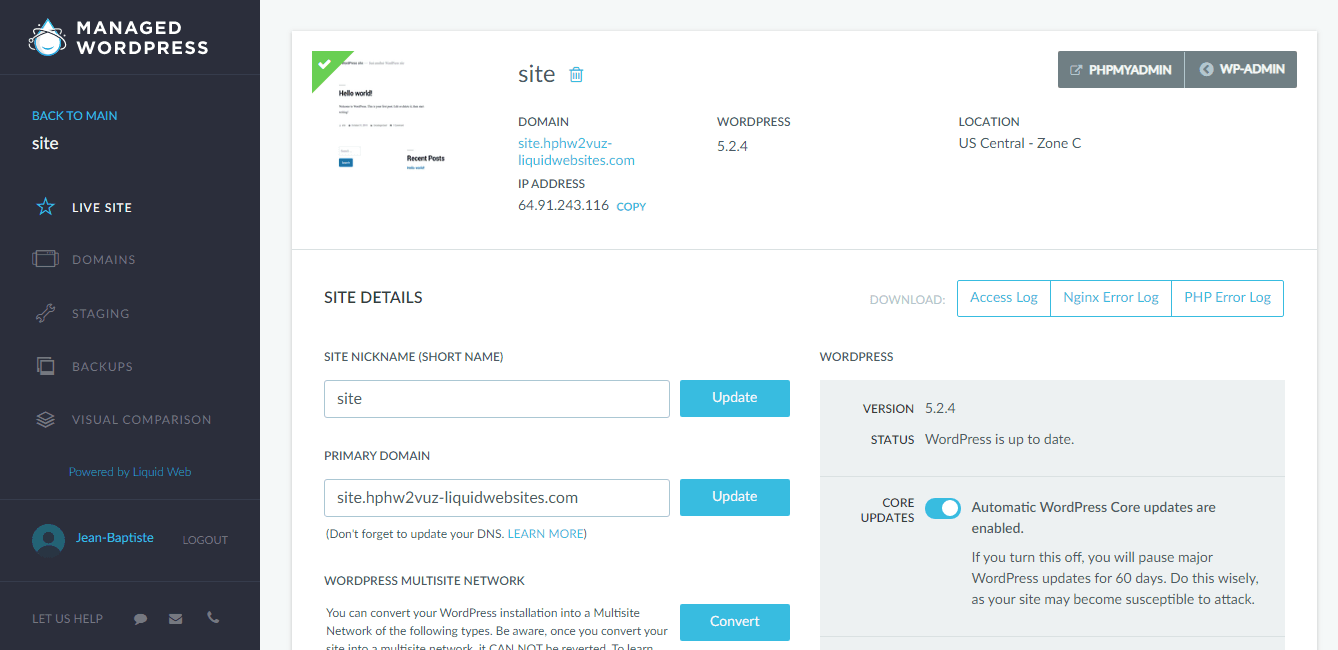
Web.com features a user-friendly drag-and-drop website builder integrated into its hosting packages, which is great for beginners. Their admin panel supports automated WordPress installation with one click, helping users get their sites up and running fast. The control panel, although effective, lacks some of the advanced, proactive management features seen in Liquid Web. For non-technical users, the drag-and-drop tool compensates well, but technical users might find the management options somewhat limited compared to Liquid Web’s more extensive capabilities.
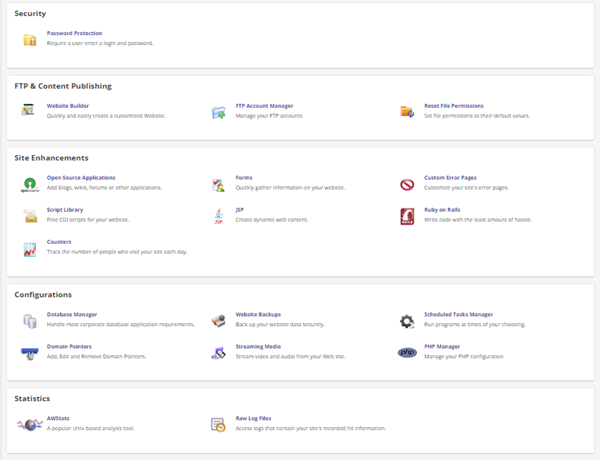
Liquid Web offers full assistance in migrating existing sites, stores, or applications at no extra cost, easing the transition process. Their proactive management ensures a seamless, stress-free migration. Web.com also provides site migration tools, yet they primarily focus on WordPress installations. This makes it easy to migrate WordPress sites but may involve more manual steps for other types of sites. While both offer migration services, Liquid Web’s coverage is broader and better supported.
Liquid Web has an industry-leading knowledge base with regularly updated articles, tutorials, and resources. They provide step-by-step guides, featured articles on a variety of relevant topics, and a prompt support guarantee. Web.com’s help center also offers a selection of articles and 24/7 support through multiple channels, but their resources are not as exhaustive or frequently updated. This makes Liquid Web’s help center more effective for users requiring in-depth, reliable support.
User management
accessibility.
Score Components:
- Role customization (40%): Flexibility in creating and defining user roles and
permissions. - Ease of management (30%): User interface and tools for managing users.
- Access control (20%): Effectiveness of access control measures for different user
levels. - Scalability (10%): Ability to manage a growing number of users efficiently.
 8.3
8.3
 7.3
7.3
🏆 Winner: Liquid Web: Comprehensive User Management Capabilities in Plesk. Liquid Web and Web.com both offer user management features, though they differ significantly in their approach to handling user roles, permissions, and accessibility. Liquid Web, using Plesk, allows for flexibility in creating and defining user roles with four default roles and the capability to create custom roles. This provides a granular level of control, making it suitable for businesses with complex needs. Web.com, on the other hand, offers two primary roles – Admin and Tech – which may be limiting for users needing more detailed role definitions. The ability to invite users via email and integrate existing Web.com accounts is useful, but the role flexibility is not as advanced as Liquid Web’s.
Liquid Web’s Plesk interface provides detailed user settings accessible through both Service Provider and Power User views, making it easier to manage various aspects of user accounts. The UI is designed to facilitate tasks such as creating new users, removing accounts, and editing roles. Web.com’s user interface, while straightforward, focuses more on simplicity by centralizing user management under the Accounts and Users tab. This may appeal to users seeking a more streamlined experience, although it might lack the in-depth control offered by Plesk.
When it comes to access control measures and handling a growing user base, Liquid Web’s Plesk offers extensive options, including the ability to define new user roles and manage additional administrator accounts. This feature is crucial for growing companies that need to scale their user management practices efficiently. Web.com provides basic access control measures suitable for smaller organizations but may struggle with scalability due to its limited role definitions and permissions.
Liquid Web user roles table:
| Role | Description | Access highlights |
|---|---|---|
| Administrator | Full access to the Plesk control panel and server management functions. | Can perform all actions, including user management, server configurations, and more. |
| Webmaster | Manage most aspects of the subscriptions, including creating new sites and configuring services such as DNS, mail, and FTP. | Cannot create new Plesk users or manage roles. |
| Application User | Limited access. | Permissions tailored to the specific applications they need to manage. |
| Accountant | Can see details of the subscriptions but cannot modify any settings. | View-only access to subscription details. |
Web.com user roles table:
| Role | Description | Access highlights |
|---|---|---|
| Admin | Control most aspects of the account, including user management and billing. | Can add, edit, and delete users; manage products; and update billing information. |
| Tech | Limited permissions, focusing on managing products and services. | Permissions to manage technical aspects such as products and services. |
Customer support
hosting provider.
Score Components:
- Support communication channels (30%): Measures the variety of customer support types
provided (live chat, chatbot, email, phone, etc.) - Availability (20%): Assesses the availability hours for each channel, including 24/7
support options. - Technical support quality (30%): Assesses whether the provider offers comprehensive
technical support, including hardware upgrades (e.g., HDD to SSD), software installations, and web
server configuration changes. - Enterprise support (20%): Checks if there are dedicated or priority support services
for enterprise-level customers.
 9.4
9.4
 8.2
8.2
🏆 Winner
Liquid Web: A hosting provider known for its stellar customer service and quick response times to client inquiries.
 |
 |
|
|---|---|---|
Phone support |
||
Live chat support |
||
Chatbot |
||
Email/ticket support |
||
Enterprise support (dedicated agent, priority support) |
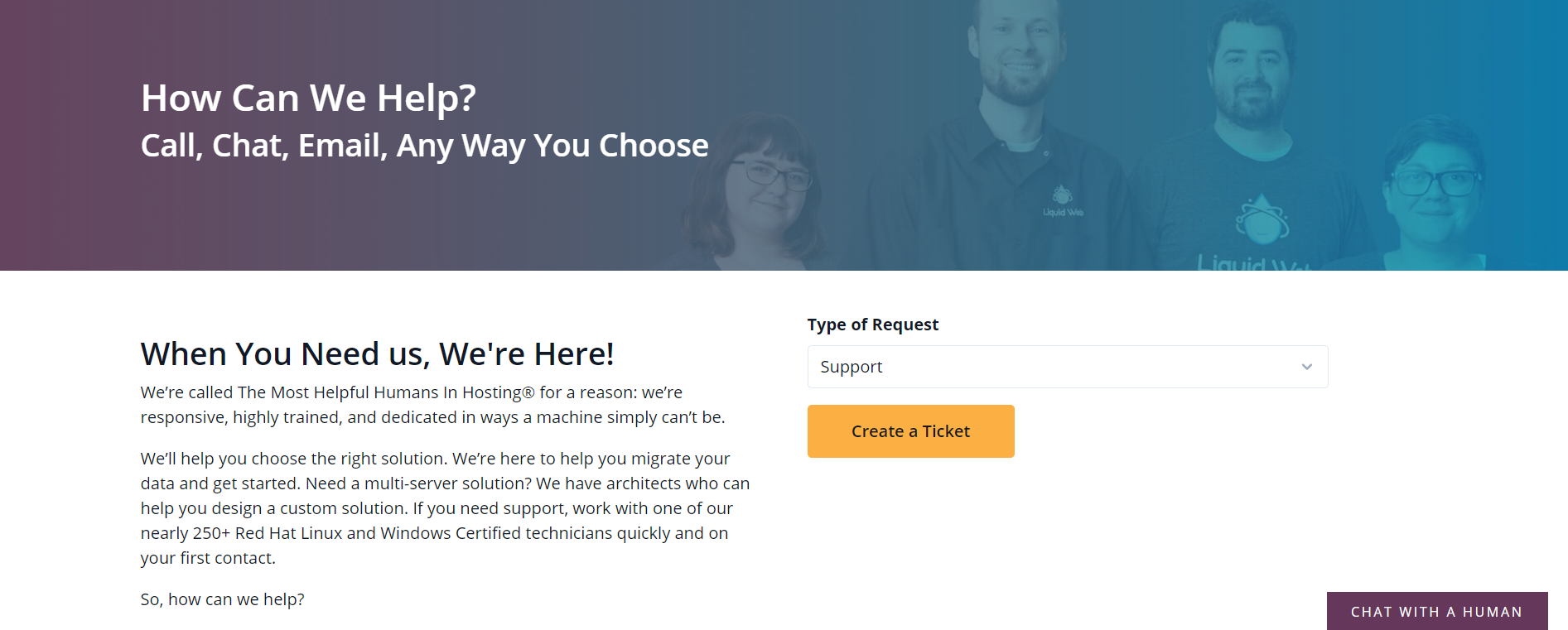
Liquid Web stands out with its extensive customer service options, including 24/7/365 live human support via phone, chat, and helpdesk. They guarantee response times of 59 seconds for phone and chat, and 59 minutes for helpdesk queries. Their support features include dedicated teams for Windows and Linux users, custom solutions by hosting advisors, and proactive monitoring, ensuring a high level of client satisfaction, reflected in their high Net Promoter Score (NPS). They also offer migration assistance and have comprehensive Service Level Agreements (SLAs) guaranteeing 100% network and power uptime.
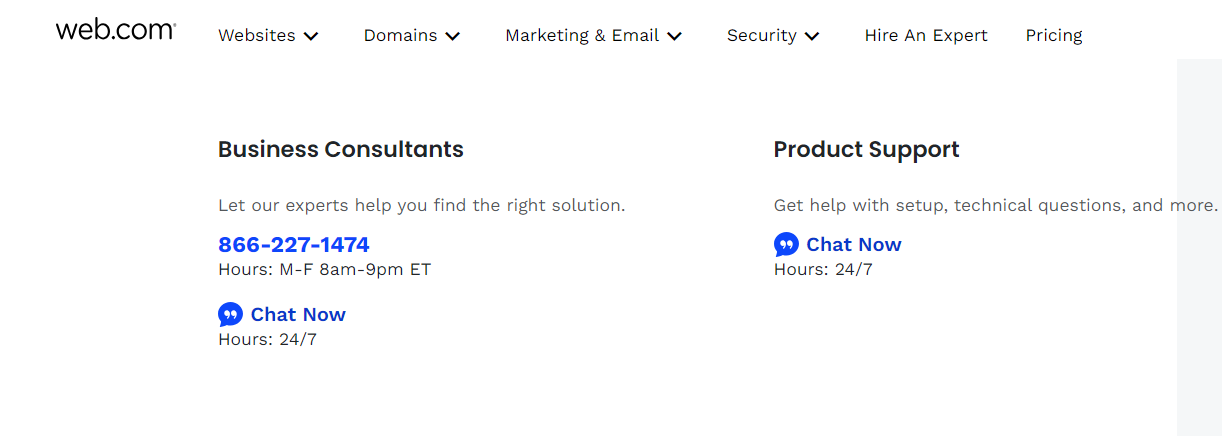
Web.com offers robust support with 24/7 technical assistance and various contact methods such as phone, email, live chat, and a ticket system. Their business consultants are available on weekdays, and they provide an online help center with detailed knowledge base articles. Though Web.com provides excellent support, it lacks enterprise support features like dedicated account managers or strategic account executives, which are available with Liquid Web. With a customer satisfaction score lower than Liquid Web, Web.com’s support, while comprehensive, does not match Liquid Web’s level of service and response guarantees.
User feedback
Customer feedback for this hosting provider is mixed, with significant polarization in user experiences. While some have praised the company for its reliable uptime, exceptional support, and proactive monitoring, others have experienced severe dissatisfaction due to frequent downtimes, unresponsive customer service, and unethical billing practices. Long-term customers, in particular, have noted a sharp decline in service quality and support efficiency, attributing it to recent management changes. Despite positive reviews highlighting excellent technical support and overall reliability, a growing number of users advise against using this provider due to these negative aspects.
The hosting provider offers a comprehensive solution for purchasing domain names, hosting, and website building, making it highly convenient for users managing multiple domains and websites. Users appreciate the convenience of having all services bundled together, but some express concerns about the limitations on hosting unlimited domains and the cost associated with individual website software. Overall, the service is satisfactory and well-rated, though there is room for improvement in accommodating users with extensive hosting needs.
FAQ
Which platform is better suited for hosting WordPress websites?
Both Liquid Web and Web.com offer comprehensive WordPress hosting services, featuring essential tools and support for seamless website management. Liquid Web stands out with its high-performance infrastructure, including AMD EPYC and Intel Xeon processors. Web.com is more budget-friendly and offers a drag-and-drop builder for easier setup, making both platforms solid choices depending on specific needs and budget.
Which hosting service offers better security features?
Liquid Web excels in offering robust security features such as firewalls, VPN, DDoS protection, and hardened server configurations, catering to advanced security requirements. Web.com focuses on essential security with features like SSL certificates, malware scanning, and automatic removal. Although both provide solid security, Liquid Web’s comprehensive approach makes it better suited for businesses needing high-security standards.
Which platform offers better customer support?
Liquid Web takes the lead in customer support with 24/7/365 human support, guaranteeing response times of 59 seconds for phone and chat and 59 minutes for helpdesk queries. They offer dedicated teams for various operating systems and proactive monitoring. Web.com also provides 24/7 support via multiple channels but falls short of Liquid Web’s response guarantees and dedicated enterprise support features.
Which hosting service offers more scalability options for growing websites?
Liquid Web provides extensive scalability options, including easy upgrades or downgrades of managed VPS services and proactive monthly autoscaling without additional costs. Their dedicated servers and Cloud hosting plans add to their scalability. Web.com supports scalable solutions but lacks automatic scaling features, making it necessary to manually upgrade plans as demand grows.
How do the providers handle email hosting and what features are included?
Web.com includes built-in email hosting with its plans, beneficial for small businesses wanting web and email hosting in one place, although specific limits aren’t provided. Liquid Web does not explicitly mention email hosting in its plans, focusing more on advanced hosting environments. Customers with Liquid Web might need to consider third-party email services like Google Workspace or Outlook.
The making of this blog
We followed a clear, step-by-step process to write and research this article.









